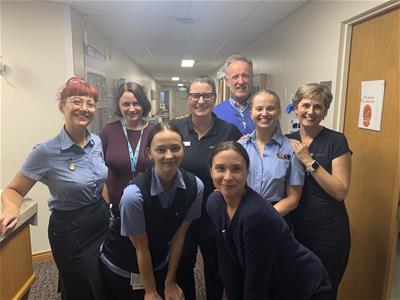Why palliative care is more than you think
Palliative care has only been recognised as a medical specialty since the year 2000, yet one in three Australians have had a family member receive this type of care. It’s more than just providing care at the end of life. It gives people the chance to live as well as possible, for as long as possible.
To mark Palliative Care Week 23 – 39 May 2021, we sat down with Dr Ralph McConaghy, Medical Director of the Wesley Palliative Care Service to find out why palliative care is more than you think.
What is palliative care?
Palliative care is a means of providing holistic care for people with a life-ending illness. Often we are caring for people with cancer, but we also see patients who have heart, respiratory, kidney or neurological disorders for example.
 Palliative care is the way we should care for all patients. It is unique in that we look at all of the needs of the person, including psychological, medical, social and spiritual. Care encompasses the whole person as well as their support group, whether that is family members, friends or carers.
Palliative care is the way we should care for all patients. It is unique in that we look at all of the needs of the person, including psychological, medical, social and spiritual. Care encompasses the whole person as well as their support group, whether that is family members, friends or carers.
Caring for people as death approaches is our core business and traditionally, we would meet patients in the last two weeks of their lives. However, that has changed overtime as we focus more on improving quality of life for our patients rather than just preparing for death. The timeline is moving backwards and we are meeting our patients much sooner in their illness, allowing us more time to have a positive impact. This means 70% of our inpatients are discharged to home at the end of their admission with improved psychospiritual wellbeing, better symptom control and community support.
What are the common perceptions of palliative care?
People commonly think that palliative care is for end of life and don’t fully appreciate the benefits we can provide for quality of life.
Who’s on the palliative care team?
We are a multi-disciplinary team of doctors, nurses, chaplains and pastoral carers, dietitians, physiotherapists, occupational therapists, pharmacists, social workers, counsellors and discharge coordinators. We meet daily to discuss the care plans for each of our patients, and we are grateful to work in a hospital which values the roles that we each play within the team to benefit our patients.
How has The Wesley palliative care service evolved?
I joined the Wesley Palliative Care Service 15 years ago and during that time we have seen a lot of change, particularly the shift in focus away from care just at the end of life. We are focussed on helping our patients to be well enough to be at home.
We have worked hard to educate our referrers and encourage them to appreciate what we can offer for their patients. When I started we cared for 300 patients per year, we now care for 900 per year.
Should we discuss end of life with our families and what are the benefits?
It’s normal to find it confronting to talk about death, but that doesn’t make it happen any sooner. It’s an important topic to discuss with our loved ones and it helps people to feel a sense of control when they know their family understands their wants. Often once you open the door to discussing death and end of life care, people are very happy and relieved to talk about it.














